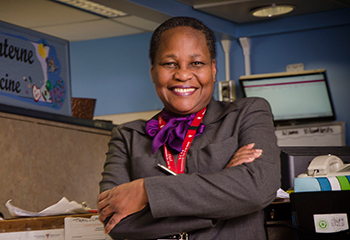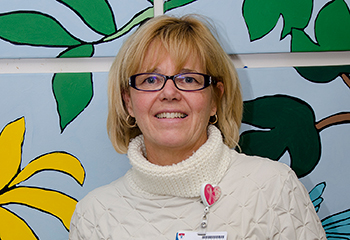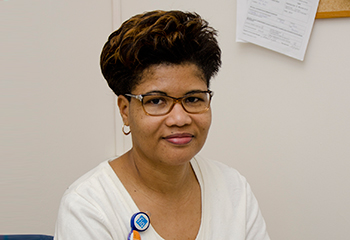March 22 to 28 is Social Work Week in Quebec!
At the McGill University Health Centre (MUHC) social workers are the eyes and ears of patients and their families. They often have first-hand knowledge that contributes to individualizing treatments and care. Their work is highly appreciated by all healthcare team members, who often heavily rely on them for their assistance and their expertise. Here, a few of our nurses and doctors highlight the key role of social workers in MUHC healthcare teams:
Dr. Anita Brown-Johnson
 Clinical Director, Secondary Care Division, Department of Family Medicine, MUHC; Medical Director, Hospitalist/Transitional Care Service and Office of Post Hospital Care and Community Support, MUHC
Clinical Director, Secondary Care Division, Department of Family Medicine, MUHC; Medical Director, Hospitalist/Transitional Care Service and Office of Post Hospital Care and Community Support, MUHC
“Social workers are the advocates for patients on our healthcare team, reminding us that patients are individuals with unique identities, needs, expectations and goals,” says Dr. Anita Brown-Johnson. “They play an instrumental role in educating patients and their families on availability and accessibility of services in their community.”
According to Dr. Brown-Johnson, they are communication agents and help build a strong relationship between the team and patients and families. The Hospitalist/Secondary Care team also works in collaboration with social workers in the community to optimize the patient's experience and quality of the transition between the hospital and the community.
“Social workers, both inside and outside the hospital, are even more important today than five or 10 years ago,” says Dr. Brown-Johnson. “And especially so now, in the context of the rapidly increasing elderly population in Quebec and the ongoing shift to population-based health services delivery.”
![]()
Joan Legair
 Nurse Manager in Internal Medicine – Montreal General Hospital
Nurse Manager in Internal Medicine – Montreal General Hospital
“The social worker is the central person in the multidisciplinary team because they fulfill the patient’s psychological needs and assist them with available resources,” says Joan Legair. “We literally feel lost without them!”
“We’ve worked with many social workers in the past but I wouldn’t want to trade this team at all,” says Legair about the group they work with in Internal Medicine at the Montreal General Hospital. “It’s a pleasure working with them—they are very instrumental in the functioning of the unit and an integral part of the team.”
![]()
Chantal Lefebvre
 Nurse Manager in Acute Respiratory Care – Montreal Chest Institute
Nurse Manager in Acute Respiratory Care – Montreal Chest Institute
“Social workers are gold to us, especially when we have patients or families with complex-care needs,” says Chantal Lefebvre. “They participate in multidisciplinary rounds with the team and contribute to the personalized psychosocial well-being of the patient.”
According to Lefebvre, social workers take the time to meet and talk with patients and their families and the Acute Respiratory Care team enjoy having the views of social workers when they discuss problematic situations for patients.
“They are the ones who make us focus on the right problems in order to be able to discharge the patient,” says Lefebvre. “They have privileged information and help the team to provide individualized care.”
![]()
Marcia Ryan
 Nurse at Royal Victoria Hospital
Nurse at Royal Victoria Hospital
“Social workers are quite good at assessing the client’s needs and situation,” says Marcia Ryan. “For example, they provide critical information to nurses required before discharging patients back to their community.”
Ryan says the social worker who helps their team is simply irreplaceable and that the team relies heavily on her, such as helping families cope with changes, including anxiety or depressive symptoms and helping the team develop strategies on handling each case.
“We would prefer that social workers never take vacation!” jokes Ryan. “That’s how important they are!”
![]()